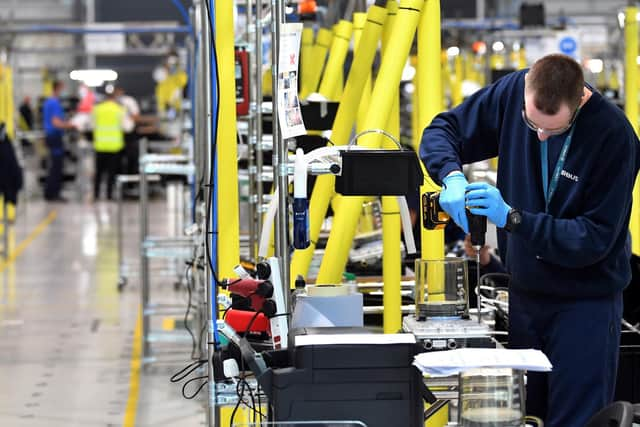Orgreave transformation shows apprenticeships are key for levelling up - Adam Hawksbee
Today, the area is unrecognisable. Huge metallic warehouses dominate the landscape, adorned with industrial brands like BAE, Rolls Royce and Boeing. Cranes work away to complete a new housing development, built to support hundreds of engineers and software developers working in the ‘Factory of the Future’.
This part of South Yorkshire is home to the Advanced Manufacturing Research Centre – a world-leading collaboration between academia and industry launched by the University of Sheffield in 2001.
Advertisement
Hide AdAdvertisement
Hide AdThe ‘secret sauce’ behind the growth of the AMRC is its approach to skills – and in particular, apprenticeships. Hundreds of manufacturing businesses, large and small, take advantage of the on-site Training Centre to develop their workforce.


Their approach should be at the heart of levelling up. It harnesses the drive of the private sector to generate high-skilled jobs in historically low-skilled areas, building on local institutions like universities and speaking to the community’s pride in its industrial heritage. And it is underpinned by an approach to apprenticeships which meets the needs of both workers and business.
But nationally, the apprenticeships system is falling well short of its potential. Onward research, released today, reveals a chronic shortage of apprenticeship opportunities for young people – hitting places like Yorkshire particularly hard. In Harrogate and Knaresborough apprenticeship starts have dropped by 70 per cent over the last decade, from 2,220 places in 2011 to just 660 in 2019. In parts of London like Tooting, Wimbledon and Richmond Park starts are actually up by over 15 per cent.
Two trends are behind this shift. On one hand, small businesses across the UK have seen a halving in the number of people starting apprenticeships since 2015 as firms struggle to navigate a complex system.
Advertisement
Hide AdAdvertisement
Hide AdOn the other, big businesses are using the funds raised through the Apprenticeship Levy to upskill existing staff instead of bringing in new workers.
Models like the AMRC show what can be done. The Government now needs to make changes to the apprenticeships system to replicate their success across the country. Our report recommends four key steps.
First, reform funding so that it works for young people. If apprenticeships are a serious alternative to academic education then they need real funding parity, but at the moment apprenticeships for 16 t0 18-year-olds are funded by businesses while A and T Levels are funded by taxpayers. These places need to be fully funded by the Government. This will give business a greater incentive to take on younger workers.
Second, the Government needs to provide more support for small businesses looking to navigate the technical education system. This is a role that regional mayors – such as Tracy Brabin or the next South Yorkshire Mayor – are well suited to play, given their broader responsibilities for skills and their regular engagement with local businesses. They should be given powers and funding over apprenticeships, and held to account for boosting numbers.
Advertisement
Hide AdAdvertisement
Hide AdThird, the system needs to be made more effective for big businesses. Innovative firms struggle to find qualifications that meet their needs, so they should be able to develop their own practical courses and get them accredited so they can be rolled out more widely. Firms should also be able to ‘front-load’ some of their apprentices’ training so they are work ready from day one.
Fourth, we need better information and transparency on the opportunities that an apprenticeship could bring. When young people are deciding whether to pursue technical or academic training, they need to know how it will affect their earnings and options. At the moment, careers advisers and recruiters have one hand tied behind their back in making the case for apprenticeships.
If Ministers act now they can fix the broken parts of the apprenticeships system and usher in transformations like the one around Orgreave. If they don’t, they will be missing a crucial tool in their mission to level up the country.
Adam Hawksbee is Deputy Director of the centre right think tank Onward.